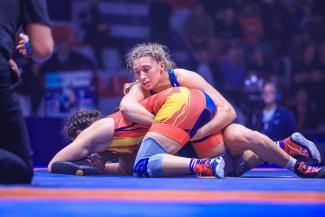Lorincz Wins Second RS Gold of the Year, Hungary Takes Team Title
Sunday, February 24, 2019 - 17:24 By Eric Olanowski

GYOR, Hungary (February 24) - Viktor LORINCZ (HUN) picked up his second Ranking Series title of the year with a 6-0 shutout victory over Algeria's Ivan LIZATOVIC in the 87kg Hungarian Open finals, and catapulted the host nation to the top of the leaderboard, five points above Iran, who led after the first nine weight classes.
In the finals, the Hungarian exposed his Algerian opponent twice with a pair of gut wrenches after the Lizatovic was dinged for passivity, and owned the 5-0 lead. A second period step out gave Lorincz the 6-0 advantage and his second Ranking Series gold of the season. The Hungarian also had a title-winning performance at the Zagreb Open two weeks ago.
Lorincz is quietly building a case to be looked at as one of the most dominate Greco-Roman wrestlers in the world after the first two Ranking Series events. Lorincz has an undefeated 9-0 record this season and has scored six shutout victories while outscoring his opponents 45-8.
Meanwhile, Korea’s KIM Seunghak and RYU Hansu collected a pair of gold medals on final day of wrestling, joining Georgia as the only nation to win more than one gold medal.
Ryu, Korea’s two-time world champion, had no trouble scoring the 8-1 victory over Ruslan KUDRYNETS (UKR) in the 67kg gold-medal bout.
Ryu smothered Kudrynets in the opening period, scoring all eight of his points. The Korean wrestler scored four points on a front head pinch/lift then tacked on an additional four points, transitioning from a takedown to a gut wrench, and commanded the 8-1 lead heading into the second period.
Ryu took the match and the 72kg gold medal with an 8-1 victory after a scoreless second period.
Kim Seunghak was the second Korean wrestler to claim a gold medal on the final day of wrestling at the Olimpia Sportpark in Gyor, Hungary. Kim won the 60kg gold medal after his finals opponent Firuz TUKHTAEV (UZB) forfeited out of the finals match.
The final two golds went to the pair of former world champions, Viktor NEMES (SRB) and Heiki NABI (EST).
In the 77kg finals, Nemes used a pair of passivity points to get past Dmytro PYSHKOV (UKR), 2-1, while Nabi used a pair of passivity points to get past Georgi CHUGOSHVILI (BLR), 2-0, in the 130kg finals.
The host nation Hungary (91 points), edged Iran (86 points) by five points to win the team title. Ukraine (83points), Turkey (68 points) and Korea (65 points) rounded out the top-five, respectively.
Team Scores
GOLD - Hungary (91 points)
SILVER - Iran (86 points)
BRONZE - Ukraine (83points)
Fourth - Turkey (68 points)
Fifth- Korea (65 points)
60kg
GOLD - Seunghak KIM (KOR) df. Firuz TUKHTAEV (UZB), via inj. def.
BRONZE - Ivan LIZATOVIC (CRO) df. Di HU (CHN), 6-0
BRONZE - Shirzad Ali BEHESHTITALA (IRI) df. Liguo CAO (CHN), 8-1
67kg
GOLD - Hansu RYU (KOR) df. Ruslan KUDRYNETS (UKR), 8-1
BRONZE - Tsuchika SHIMOYAMADA (JPN) df. Shogo TAKAHASHI (JPN), via fall
BRONZE - Mate NEMES (SRB) df. Soslan DAUROV (BLR), 4-1
77kg
GOLD - Viktor NEMES (SRB) df. Dmytro PYSHKOV (UKR), 2-1
BRONZE - Volodymyr YAKOVLIEV (UKR) df. Pavel LIAKH (BLR), 4-1
BRONZE - Hyeonwoo KIM (KOR) df. Laszlo SZABO (HUN), 3-3
87kg
GOLD - Viktor LORINCZ (HUN) df. Bachir SID AZARA (ALG), 6-0
BRONZE - Radzik KULIYEU (BLR) df. Fabio PARISI (ITA), 3-2
BRONZE - Erik SZILVASSY (HUN) df. Mikalai STADUB (BLR), 6-3
130kg
GOLD - Heiki NABI (EST) df. Georgi CHUGOSHVILI (BLR), 2-0
BRONZE - Marko KOSCEVIC (CRO) df. Alin ALEXUC CIURARIU (ROU), 2-1
BRONZE - Balint LAM (HUN) df. Mykola KUCHMII (UKR), 1-1


Share your thoughts.
Comments